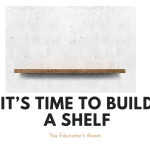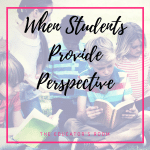I teach in the same building as my cooperating teacher from my student teaching placement in college. Mrs. Burcham taught me everything I know and apply today working as a Special Education teacher. Since I graduated, Mrs. Burcham and I have become colleagues by chance, friends by choice. We check in on each other during the school day, and enjoy sharing family dinners, days at the pool, and afternoons on the porch outside of school.
Teacher pals obviously and undeniably benefit the adults in the friendship. When you find your teacher tribe, you can’t imagine doing this work without them. Professionals who “get it” serve as confidants through highs and lows, challenging you to be better while acknowledging your strengths. Teacher friends spend time together at first perhaps by convenience or happenstance, but eventually, make conscious decisions to be in each other’s company outside the circumstances of the mandated school schedule.
In my teaching experience, there is a tendency for educators to isolate their “home” versus “school” lives. I have even heard teachers encouraging students to “leave things at the door” (metaphorically) in efforts to maintain the academic integrity of a space and to avoid outside “distractions.” Teachers can hold themselves to a standard of classroom managers and deliverers of content to the neglect of the human. Mrs. Burcham and I, however, have found undeniable benefits in allowing our friendship to transparently enter our teaching practice.
We know that not just academic content but also social skills are teachable and learnable. With this knowledge, it seems infantile not to incorporate teacher friendship into our professional practice for the benefit of students. When quality, healthy friendships are modeled, our students are more likely to develop such friendships themselves. It can be challenging, especially for the middle school students Mrs. Burcham and I teach, to identify authentic friendship. In Suzanne Degges-White’s piece “The 13 Essential Traits of Good Friends” in Psychology Today, she lists 13 qualities of friendship she is able to categorize under three different characteristics: integrity, caring, and congeniality. Mrs. Burcham and I are grateful to have a friendship identifiable by all three qualities; below are ways you and your teacher friends are modeling these traits for your students as well.
Integrity
Trust, honesty, dependability, and loyalty: these are the marks of integritous friendship. So when students notice Mrs. Burcham checking that I didn’t miss my lunch break or drink coffee past noon, they see dependability and trust in action. When I ask her advice and she gives honest, constructive feedback, students witness a friend of quality. Mrs. Burcham and I share students in classes who readily form strong bonds with us as teachers after observing our loyalty to each other as friends and colleagues. The trust, honesty, dependability, and loyalty catches some impactful contagion within our classroom communities.
Caring
Mrs. Burcham has been by my side through the inevitable highs and lows of my teaching career. When students see us sharing her classroom closet, taking peaceful breaks in each other’s classrooms, and eating lunch together, we become trusted, cared for, respecteds adult in each other’s classroom cultures. When we share stories of summer nights on the porch with her family, shared meals after school, or fun birthday surprises, students realize our bond is more than just a forged coincidental connection. It is organic, non-judgmental, and supportive. Students learn through our inadvertent modeling of listening and caring. The most impactful piece is that we care not just because we have to but because we want to. Students can feel empowered to seek caring friendships for themselves as well when they know the possibilities.
Congeniality
There are clear practical benefits to the friendship between Mrs. Burcham and myself. It should be noted, however, that we are not just friends out of utility; we legitimately like spending time together. While we are there for each other when confidence is low or times are tough, we are also able to have a sound friendship in our self-confidence. When we exude confidence and self-assurance, despite the fact that we need each other’s help to find it again at times, students are given permission to demonstrate this same sense of self-efficacy. They see it as a desirable trait in a friend. Mrs. Burcham and I like to laugh and have fun together. Students then see friends not just as confidants who listen to you or defend your honor. They witness friendship adding joy to our lives.
Friendship is a joy we all deserve: teachers, students, and everyone in between. Mrs. Burcham and I aren’t just friends because it’s convenient. We are friends because we genuinely enjoy each other’s personalities and company. I love students having the opportunity to see that, even as we grow into different roles and responsibilities with age, we never outgrow the benefits of fun and friendship.








This article is a wonderful example of teacher-self care! When teachers feel overwhelmed and stressed on many levels, they often isolate themselves. Finding a teacher/mentor/friend gives you accountability, support as well as a great sounding board when “Life happens”. I hope many will read this–especially those new to the profession. This is definitely something that needs to be taught to new educators.